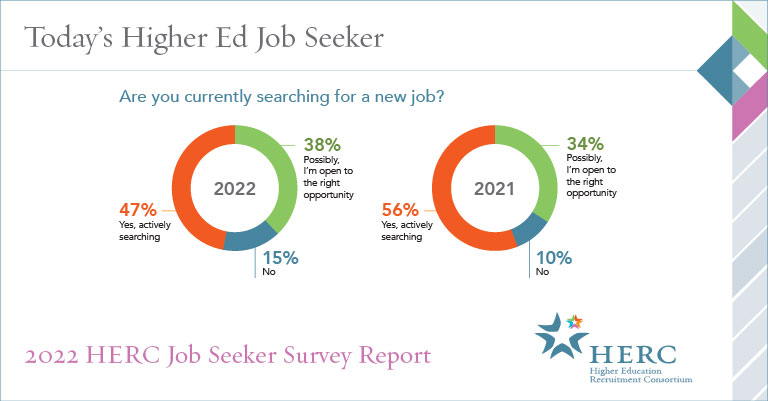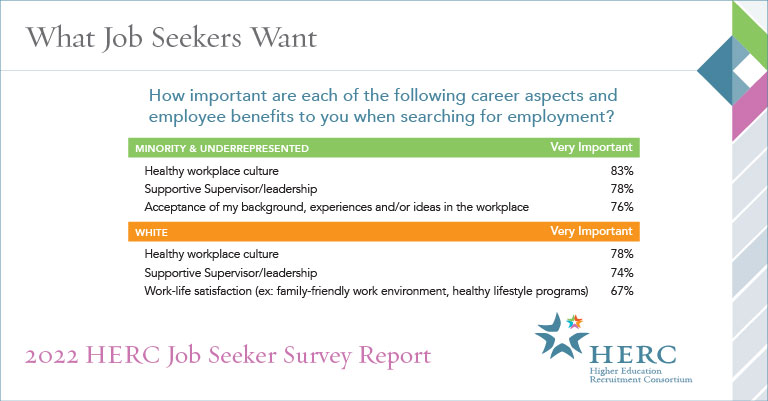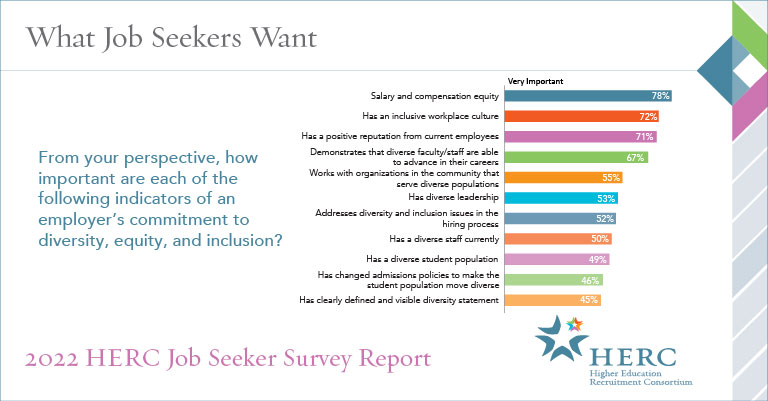So That’s What You Want (2022 HERC Job Seeker Survey Results)
Are job seekers in higher education currently searching for a new job? What would keep employees from leaving their current jobs? Earlier this year, you might have participated in HERC’s annual job seeker survey that aims to understand the experiences of those looking for work in higher education and help higher education employers identify ways they can find and keep staff and faculty.
As employers continue to grapple with the “Great Resignation,” they are faced with filling job vacancies and addressing quickly evolving employee needs. Based on the results of our 2022 HERC Job Seeker Survey, we developed recommendations to help colleges and universities create inclusive and equitable recruitment and retention policies.
Below, we highlight some of our survey findings and takeaways.
Who Responded
The survey had 2,061 respondents, who reported these demographics:
- 79% hold master’s degrees or higher
- 39% are people of color
- 17% are individuals with disabilities
- 3% are veterans
- 68% identified as women; 28% identified as men; 2% identified as third-gender or non-binary
- 1% are ages 18 to 21; 34% are 22 to 37; 37% are 38 to 53; and 29% are over 53
58% of survey respondents reported being staff and 31% indicated they are faculty. Some individuals reported being both staff and faculty.
Who’s Looking for New Opportunities

Compared to last year, fewer respondents are actively looking for a new job (56% in 2021 vs. 47% in 2022). With more people refraining from seeking new opportunities, employers should consider shifting some resources to employee retention and raising brand awareness among passive job seekers. Of the 85% of survey respondents that noted they were actively or passively job searching, more than half were not exclusively seeking opportunities in higher education.
What Keeps Employees from Leaving

Focusing on a healthy workplace with supportive leadership is key to keeping employees: Healthy workplace culture and supportive leadership were rated as the top two career aspects for both minority & underrepresented and white respondents. For minority & underrepresented job seekers, “acceptance of my background” was rated third, while “work-life satisfaction” was third for white respondents.
Diversity, Equity, and Inclusion (DEI) Matters

Diversity and inclusion policies are “somewhat” to “very” important to the majority (81%) of respondents. Demonstrated commitment to diversity, equity, and inclusion in the workplace is important to job seekers. Concrete evidence including salary equity (78%), inclusive workplace culture (72%), and a positive reputation from employees (71%) are the most important DEI factors.
We want to hear from you! Understanding what job seekers need and want is important to our mission to advance diversity, equity, and inclusion in the higher education workforce. Please participate in our monthly quick polls on LinkedIn (follow HERC on LinkedIn) and our annual job seeker survey (the next one will be in early 2023).
JOIN HERC > Do you work at a higher ed institution that’s striving to diversify its workforce and create an inclusive workplace? Our new publication, “2022 HERC Job Seeker Survey Report: Reaching, Attracting, and Keeping Today’s Higher Ed Professional,” is available to HERC members. Learn more about how HERC supports its member institutions in recruiting and retaining talented and diverse employees.

